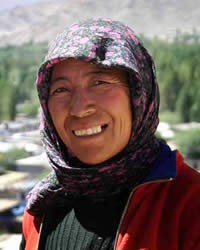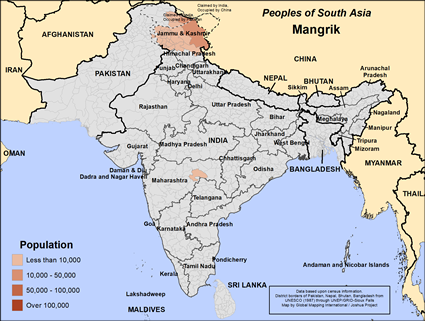Mangrik in Pakistan

Photo Source:
Steve Evans - Flickr
Creative Commons
|

Map Source:
People Group data: Omid. Map geography: UNESCO / GMI. Map Design: Joshua Project.
|
| People Name: | Mangrik |
| Country: | Pakistan |
| 10/40 Window: | Yes |
| Population: | 55,000 |
| World Population: | 79,000 |
| Primary Language: | Balti |
| Primary Religion: | Buddhism |
| Christian Adherents: | 0.13 % |
| Evangelicals: | 0.13 % |
| Scripture: | Portions |
| Ministry Resources: | No |
| Jesus Film: | Yes |
| Audio Recordings: | Yes |
| People Cluster: | South Asia Buddhist |
| Affinity Bloc: | South Asian Peoples |
| Progress Level: |
|
Introduction / History
The Mangrik people, an ethnic group with ancient roots, primarily inhabit the mountainous regions of northern Pakistan. They trace their ancestry to various Central Asian tribes that migrated to the region centuries ago. Historically, the Mangrik have lived in remote, rugged terrains, which have shaped their resilient and self-sufficient lifestyle. Over time, they developed a distinct culture, language, and traditions that reflect their adaptation to the harsh mountainous environment.
What Are Their Lives Like?
Today, the Mangrik people lead a life deeply connected to their natural surroundings. They primarily engage in agriculture, herding and small-scale trade to sustain their communities. Their villages, often located in isolated valleys, rely on terraced farming and livestock rearing. The Mangrik community values strong family ties and social cohesion, with communal activities and celebrations playing a central role in their daily lives. Despite facing geographic isolation and limited access to modern amenities, they maintain their culture through traditional music, dance and crafts.
Muslim butchers ensure a supply of mutton to the Mangrik, as the latter refrain from killing animals. They have attained a high level of literacy, and some have even gone for higher education to the universities of Jammu and Kashmir.
What Are Their Beliefs?
The Mangrik practice Buddhism, the major world religion based on the teachings of Siddhartha Gautama or the Buddha, who lived in the 6th and 5th century BC in ancient India. The Buddha taught the Four Noble Truths by which one can gain spiritual knowledge and escape the endless cycles of reincarnation. Theravada, one of the two major branches of Buddhism, declares that by following the Noble Eightfold Path of right intentions and right actions that a Buddhist can achieve nirvana or a state of freedom and salvation. Mahayana Buddhism, the other main branch of Buddhism, asserts that by following the six perfections that a Buddhist can move along the path to Enlightenment. Tibetan Buddhism falls within the Mahayana school. This form of Buddhism, which is what the Mangrik people embrace, incorporates the bon form of shamanism.
To most Buddhists, however, these things have far less meaning than their traditional beliefs, which are usually animistic. In animism, evil spirits must be appeased through prayers, sacrifices and rituals. Buddhism allows people to mix Buddhist teachings with traditional religion.
Two of the important Buddhist yearly holidays are Vesak, the Buddha's birthday celebrated in May or June and Bodhi Day, the holiday which commemorates the day that the historical Buddha experienced enlightenment under a Bodhi tree.
What Are Their Needs?
The Mangrik people face several critical needs that require attention for their community's development. Improved access to education is vital, as many children lack educational opportunities due to the remote locations of their villages. Enhanced healthcare services are crucial, with limited medical facilities available in their mountainous region. Economic support through sustainable agricultural practices and market access can help improve their livelihoods. Infrastructure development, including better roads and communication networks, will also greatly benefit the Mangrik people by connecting them to broader socio-economic opportunities. Addressing these needs will enable the Mangrik community to thrive.
Prayer Points
Pray for a Christ-ward movement among the Mangrik people in Pakistan that will bless them for eternity.
Pray for loving workers.
Pray for the Mangrik people to become disillusioned with their spirituality and for them to have a hunger for truth and righteousness.
Pray for their protection from any insurgency that could happen in their region.